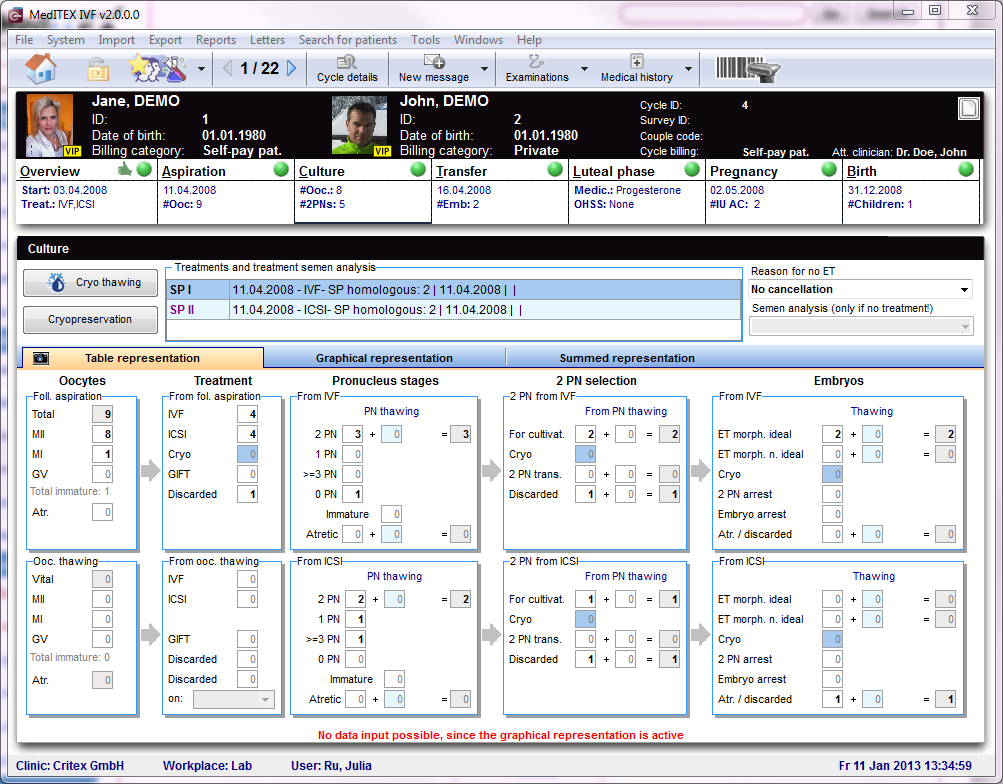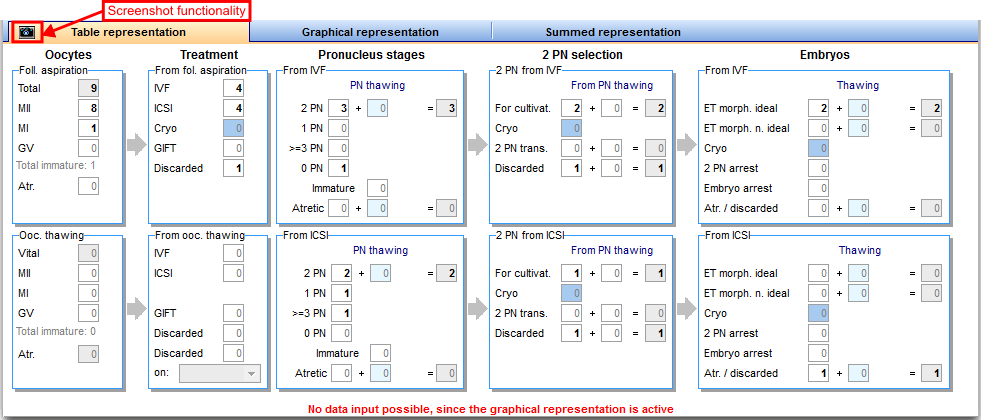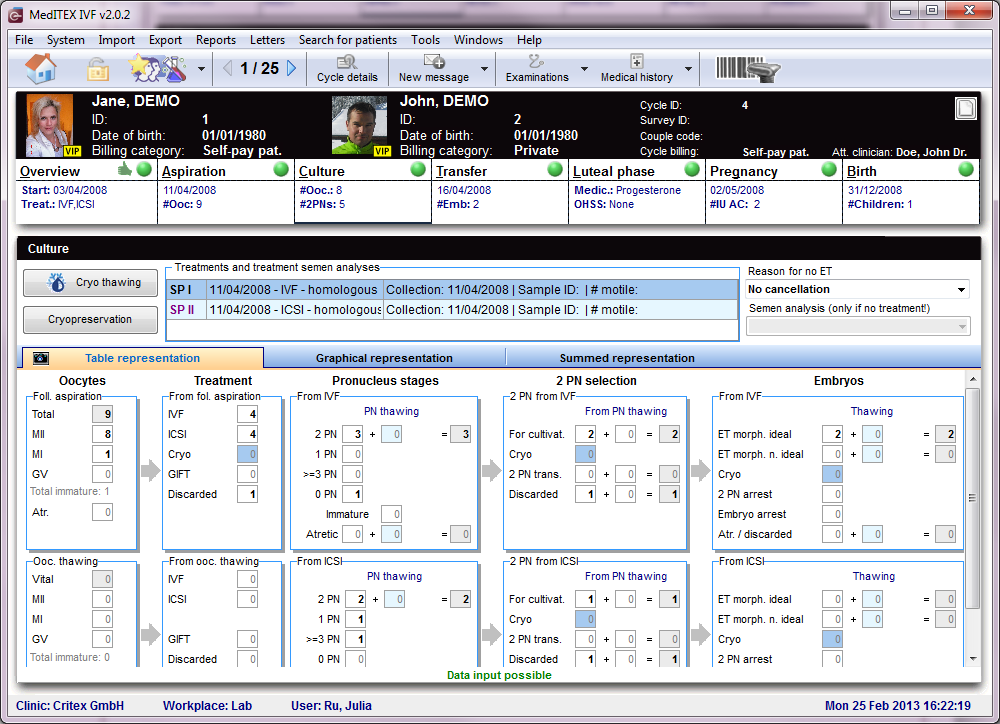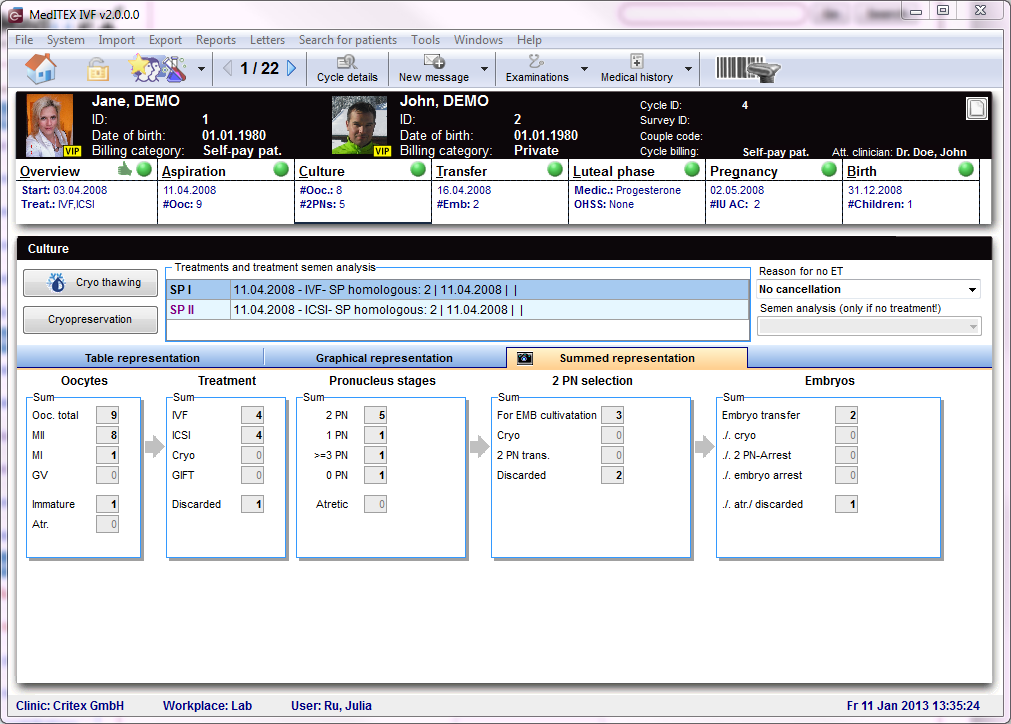Cycle Culture
From MedITEX - Wiki
| Line 6: | Line 6: | ||
<p> </p> | <p> </p> | ||
<h3>Table representation</h3> | <h3>Table representation</h3> | ||
| + | <p>Before entering data you should consider if you wish to put the focus of your documentation on summarized entries, or also on the individual oocyte. In the first case you should enter the data only in the table view, while in the second you should use the graphical representation. The graphical representation can also be used to "fine-tune” entries made in the tabular view.</p> | ||
| + | <p>The table and graphical representations are linked logically. Changes made in one of the two views will also be represented in the other.</p> | ||
<table border="0"> | <table border="0"> | ||
<tbody> | <tbody> | ||
| Line 13: | Line 15: | ||
</tbody> | </tbody> | ||
</table> | </table> | ||
| − | <p> | + | <p>This table allows you to efficiently and quickly enter all culture types in a DIR-compliant way. You can document aspiration cycles (IVF/ICSI), thawing cycles, conservation processes and alle possible combinations of these three.</p> |
| − | < | + | <table border="0"> |
| + | <tbody> | ||
| + | <tr> | ||
| + | <td><strong>Advantages:</strong></td> | ||
| + | <td>Fast, DIR-compliant</td> | ||
| + | </tr> | ||
| + | <tr> | ||
| + | <td><strong>Disadvantages</strong>: <br /></td> | ||
| + | <td>Documentation of sums only, not on cell level</td> | ||
| + | </tr> | ||
| + | </tbody> | ||
| + | </table> | ||
<p> </p> | <p> </p> | ||
<table style="margin-left: auto; margin-right: auto;" border="0"> | <table style="margin-left: auto; margin-right: auto;" border="0"> | ||
| Line 55: | Line 68: | ||
<p> </p> | <p> </p> | ||
<h3>Graphical representation</h3> | <h3>Graphical representation</h3> | ||
| + | <p>The graphical representation allows a documentation of each egg cell, its development status and cell-specific processes on all culture days.</p> | ||
<table border="0"> | <table border="0"> | ||
<tbody> | <tbody> | ||
| Line 65: | Line 79: | ||
<p>The table and graphical representations are linked logically. Changes made in one of the two views will also be represented in the other.</p> | <p>The table and graphical representations are linked logically. Changes made in one of the two views will also be represented in the other.</p> | ||
<p>The graphical representation can also be used to "fine-tune” entries made in the tabular view.</p> | <p>The graphical representation can also be used to "fine-tune” entries made in the tabular view.</p> | ||
| + | <table border="0"> | ||
| + | <tbody> | ||
| + | <tr> | ||
| + | <td><strong>Advantages:</strong></td> | ||
| + | <td> | ||
| + | <p>You can document each individual oocyte on all culture days; you can enter assisted hatching and polar body diagnostics; complient to EU. Directive; compliant to DIR.</p> | ||
| + | </td> | ||
| + | </tr> | ||
| + | <tr> | ||
| + | <td><strong>Disadvantages</strong>: <br /></td> | ||
| + | <td>More time-consuming in the case of a large number of oocytes.</td> | ||
| + | </tr> | ||
| + | </tbody> | ||
| + | </table> | ||
| + | <p> </p> | ||
<h3>Summed representation</h3> | <h3>Summed representation</h3> | ||
<table border="0"> | <table border="0"> | ||
Revision as of 15:53, 21 February 2013
Precise documentation of every single oocyte.
Every oocyte is unique. Several methods have been developed to evaluate the development potential on cell and cleavage level. Oocytes are extracted, undergo a treatment, are frozen if necessary, transported, stored, thawed, cultivated again and transferred. Enough reasons to create documentation on oocyte level. The EU Directive "Cells and Tissue" also requires documentation on identifiability and traceability of each oocyte.
MedITEX IVF allows detailed documentation of all development stages and manipulations of oocyte – exact to the day, including photos, scores, comments, performed analysis etc.
MedITEX IVF for the first time allows you to document complex laboratory processes realistically, for example post maturing of individual oocyte, adding of thawed oocytes or performing fertilization on the following day.
Every single obtained oocyte will be represented visually in a graphical overview. It allows entries for a maximum of ten cultivation days, although more then 5 to 6 days will most likely never be necessary. In the overview, development stages and manipulations such as insemination and injections, assisted hatching, polar body diagnosis, freezing and thawing processes, embryo transfer and more, can be assigned exact to the cell and day. All this can be done with a few mouse-clicks on the corresponding cells.
Table representation
Before entering data you should consider if you wish to put the focus of your documentation on summarized entries, or also on the individual oocyte. In the first case you should enter the data only in the table view, while in the second you should use the graphical representation. The graphical representation can also be used to "fine-tune” entries made in the tabular view.
The table and graphical representations are linked logically. Changes made in one of the two views will also be represented in the other.
This table allows you to efficiently and quickly enter all culture types in a DIR-compliant way. You can document aspiration cycles (IVF/ICSI), thawing cycles, conservation processes and alle possible combinations of these three.
| Advantages: | Fast, DIR-compliant |
| Disadvantages: |
Documentation of sums only, not on cell level |
| <a href="/index.php?title=Cryo thawing"><img style="display: block; margin-left: auto; margin-right: auto; border: 2px dotted blue;" src="/images/CryoThawing.png" alt="" width="139" height="35" /></a> | |
| <img src="/images/Cryopre.png" alt="" width="137" height="31" /> |
| <img style="display: block; margin-left: auto; margin-right: auto;" src="/images/Reason.png" alt="" width="232" height="81" /> | |
| <a href="/index.php?title=Treatments and treatment semen analysis"><img style="display: block; margin-left: auto; margin-right: auto; border: 2px dotted blue;" src="/images/TreatCul.png" alt="" width="592" height="86" /></a> |
Graphical representation
The graphical representation allows a documentation of each egg cell, its development status and cell-specific processes on all culture days.
If that appears too complex, you can quickly insert data within a table overview. There you only need to enter summarized information about obtained, treated, fertilized and transferred oocyte.
The table and graphical representations are linked logically. Changes made in one of the two views will also be represented in the other.
The graphical representation can also be used to "fine-tune” entries made in the tabular view.
| Advantages: |
You can document each individual oocyte on all culture days; you can enter assisted hatching and polar body diagnostics; complient to EU. Directive; compliant to DIR. |
| Disadvantages: |
More time-consuming in the case of a large number of oocytes. |
Summed representation
An additional summed representation provides a quick overview of the culture processes. The tabs allow you to change between the views with a single mouse click.
| <a href="/index.php?title=MedITEX_IVF_manual">Back to the MedITEX IVF menu</a><a href="/index.php?title=Cycles"></a> | <a href="/index.php?title=MedITEX_IVF_manual"> </a><a href="/index.php?title=MedITEX_IVF_manual"> </a><a href="/index.php?title=Cycles">Back to the cycle overview</a> | <a href="#top">Back to top</a> |



